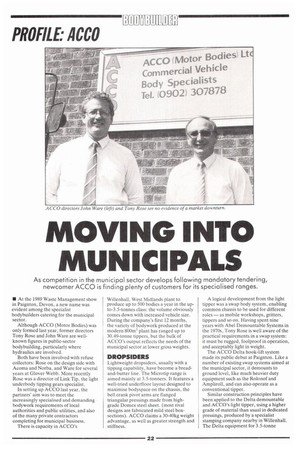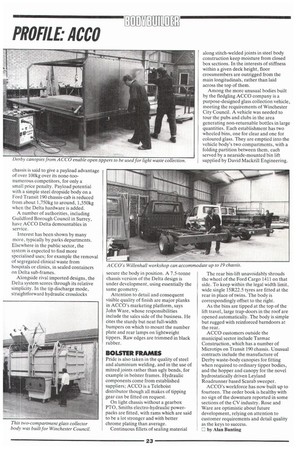MOVING INTO MUNICIPALS
Page 136

Page 137

If you've noticed an error in this article please click here to report it so we can fix it.
• At the 1989 Waste Management show in Paignton, Devon, a new name was evident among the specialist bodybuilders catering for the municipal sector.
Although ACCO (Motor Bodies) was only formed last year, former directors Tony Rose and John Ware are wellknown figures in public-sector bodybuilding, particularly where hydraulics are involved_ Both have been involved with refuse collectors: Rose on the design side with Acorna and Norba, and Ware for several years at Glover Webb. More recently Rose was a director of Link Tip, the light underbody tipping gears specialist.
In setting up ACCO last year, the partners' aim was to meet the increasingly specialised and demanding bodywork requirements of local authorities and public utilities, and also of the many private contractors completing for municipal business.
There is capacity in ACCO's
Willenhall, West Midlands plant to produce up to 500 bodies a year in the upto-3.5-tonnes class: the volume obviously comes down with increased vehicle size. During the company's first 12 months, the variety of bodywork produced at the modern 800m2 plant has ranged up to 30.49-tonne tippers, but the bulk of ACCO's output reflects the needs of the municipal sector at lower gross weights.
Lightweight dropsiders, usually with a tipping capability, have become a breadand-butter line. The Microtip range is aimed mainly at 3.5-tonners. It features a well-tried underfloor layout designed to maximise bodyspace on the chassis, the bell crank pivot arms are flanged triangular pressings made from highgrade Dornex steel sheet. (most rival designs are fabricated mild steel boxsections). ACCO claims a 30-40kg weight advantage, as well as greater strength and stiffness. A logical development from the light tipper was a swap body system, enabling common chassis to be used for different roles — as mobile workshops, gritters, tippers and so on. Having spent nine years with Abel Demountable Systems in the 1970s, Tony Rose is well aware of the practical requirements in a swap system: it must be rugged, foolproof in operation, and acceptably light in weight.
The ACCO Delta hook-lift system made its public debut at Paignton. Like a number of existing swap systems aimed at the municipal sector, it demounts to ground level, like much heavier duty equipment such as the Rolonof and Ampliroll, and can also operate as a conventional tipper.
Similar construction principles have been applied to the Delta demountable and ACCO's light tipper, using a higher grade of material than usual in dedicated pressings, produced by a specialist stamping company nearby in Willenhall. The Delta equipment for 3.5-tonne chassis is said to give a payload advantage of over 100kg over its none-toonumerous competitors, for only a small price penalty. Payload potential with a simple steel dropside body on a Ford Transit 190 chassis-cab is reduced from about 1,750kg to around, 1,550kg when the Delta hardware is added.
A number of authorities, including Guildford Borough Council in Surrey, have ACCO Delta demountables in service.
Interest has been shown by many more, typically by parks departments. Elsewhere in the public sector, the system is expected to find more specialised uses; for example the removal of segregated clinical waste from hospitals or clinics, in sealed containers on Delta sub-frames.
Alongside rival imported designs, the Delta system scores through its relative simplicity. In the tip discharge mode, straightforward hydraulic crosslocks secure the body in position. A 7.5-tonne chassis version of the Delta design is under development, using essentially the same geometry.
Attention to detail and consequent visible quality of finish are major planks in ACCO's marketing platform, says John Ware, whose responsibilities include the sales side of the business. He cites the sturdy but neat full-width bumpers on which to mount the number plate and rear lamps on lightweight tippers. Raw edges are trimmed in black rubber.
Pride is also taken in the quality of steel and aluminium welding, and in the use of mitred joints rather than ugly bends, for example in bolster frames. Hydraulic components come from established suppliers; ACCO is a Telehoist distributor though all makes of tipping gear can be fitted on request.
On light chassis without a gearbox PTO, Smiths electro-hydraulic powerpacks are fitted, with rams which are said to be a lot stronger and with better chrome plating than average.
Continuous fillets of sealing material along stitch-welded joints in steel body construction keep moisture from closed box sections. In the interests of stiffness within a given deck height, floor crossmembers are outrigged from the main longitudinals, rather than laid across the top of them.
Among the more unusual bodies built by the fledgling ACCO company is a purpose-designed glass collection vehicle, meeting the requirements of Winchester City Council. A vehicle was needed to tour the pubs and clubs in the area generating non-returnable bottles in large quantities. Each establishment has two wheeled bins, one for clear and one for coloured glass. They are emptied into the vehicle body's two compartments, with a folding partition between them, each served by a nearside-mounted bin lift supplied by David Mackrill Engineering.
The rear bin-lift unavoidably shrouds the wheel of the Ford Cargo 1411 on that side. To keep within the legal width limit, wide single 15R22.5 tyres are fitted at the rear in place of twins. The body is correspondingly offset to the right.
As the bins are tipped at the top of the lift travel, large trap-doors in the roof are opened automatically. The body is simple but rugged with reinforced barndoors at the rear.
ACCO customers outside the municipal sector include Tarmac Construction, which has a number of Microtips on Transit 190 chassis. Unusual contracts include the manufacture of Derby waste-body canopies for fitting when required to ordinary tipper bodies, and the hopper and canopy for the novel hydrostatically driven Leyland Roadrunner based Scarab sweeper.
ACCO's workforce has now built up to fourteen. The order book is healthy with no sign of the downturn reported in some sections of the CV industry. Rose and Ware are optimistic about future development, relying on attention to customer requirements and detail quality as the keys to success.
D by Alan Bunting






















































































































































